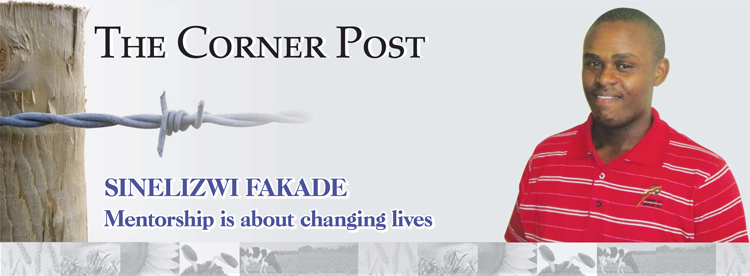June 2017

In this new series, The Corner Post will feature the mentors who form part of the Grain SA mentorship programme. A mentor is that person who gives you advice on how to achieve your own goals and dreams.
If you look for a synonym for the word ‘change’ the list is endless – alter, transform, exchange, modify, amend, replace, substitute, convert, adjust, shift. However, one thing is certain, change involves a process through which something grows and becomes something different.
To Sinelizwi Fakade the mentorship programme is all about changing lives and ensuring food security at the bottom level. He was employed by Grain SA as a Provincial Co-ordinator in the Eastern Cape region in February 2016 and joined the mentorship programme at the same time. Lawrence Luthango, his predecessor, who is now a fully-fledged mentor in the Eastern Cape showed him the ropes and was his mentor for four months.
Although he is not a farmer, he studied agriculture extensively and has specifically specialised in rural development, food security and policy. As far as practical experience goes he has been exposed to the farming environment for the past five years. His studies involved vocational work and he also did a lot of volunteer work on commercial farms in and around the Eastern Cape.
As a student, his studies also focused on rural development, extension resource management and production and now has the opportunity to see how it integrates practically. Working as a mentor has shown him the imperative aspect of what Grain SA is doing. Sinelizwi has just completed a Master’s Degree in Food Security and has started his PhD which he hopes to complete by 2020.
A holistic approach
With the Eastern Cape having a data basis with 2 300 registered farmers already forming part of the programme, it is quite a task to ensure that the necessary knowledge is conveyed to all. Theoretical knowledge is communicated at study groups, but the practical visits is where the real changes takes place. Sinelizwi visits between four and ten groups (comprising 40 members each) per week for two hour sessions at a time. ‘I see these visits as holistic where theoretical information is conveyed on the one side and thereafter thoroughly practiced ensuring that farmers understand exactly what has been discussed,’ he explains.
It is imperative that farmers have the basic production knowledge. ‘In the Eastern Cape, dry beans and maize forms the corner stone for farmers, so it is important to get the message across for example how production works, what you need to know as far as mechanisation is concerned, rules about marketing, ensuring that your budget balances, etc.’ Farmers should be made aware of all the value chain processes that happens to ensure that they become part and parcel of the farming industry. Although it depends on the level of the farmer the three key areas Sinelizwi identified are production, management and marketing.
He has had very positive feedback from the farmers, especially as far as the one-on-one sessions are concerned and says it’s all because of the Grain SA programme. This programme is receiving such good reviews in the Eastern Cape that more farmers are yearning to get involved. These farmers probably agree with a statement made by the well-known South African author, Max du Preez: ‘We cannot become what we want to be by remaining what we are’.
At the farmers’ days in the Eastern Cape success stories are often shared by farmers. ‘It is inspiring to hear farmers speaking of their success of how the programme changed their farming practices and increased their yield from 30 to 100 bags. I don’t know if you want to call that development or not, but in my eyes that is definitely progress,’ Sinelizwi says.
Replacing poverty with opportunity
‘We have a huge problem in the country with the greater part of the population going to bed at night without having eaten a substantial meal for the day.’ He is therefore enthusiastic about a programme that alters a life of poverty with one where goals are attainable through training and where farmers can become independent. To him independence is crucial and development programmes must change lives.
He has witnessed farmers who produced hardly enough for their own community who are now producing maize of commercial quality. ‘That is transformation – not just changing for the sake of change, but empowering an individual,’ Sinelizwi says and adds, ‘Grain SA’s Farmer Development Programme is succeeding and our goal is changing lives, equipping smallholder farmers and ensuring that farmers are left independent with a commercial future.’
It is not only the lives of the farmers that are changed, but the lives of all those involved in this programme. ‘To see the smile on the face of someone that never thought they would ever harvest 100 bags of maize, is one of the most rewarding moments I have experienced,’ he shares of the impact the programme has had in his own life.
One of the most exceptional events he witnessed in the Eastern Cape was when a 74-year-old lady was so inspired by what was demonstrated that she picked up a 20 litre knapsack sprayer, put it on her back and started spraying the maize at knee height.
To farmers not yet part of this programme, he wants to say: ‘You must make a choice to take a chance and be part of this journey or your life will never change’.
This month’s edition of The Corner Post was written by Louise Kunz, Pula Imvula contributor. For more information, send an email to louise@infoworks.biz.
Publication: June 2017
Section: Pula/Imvula